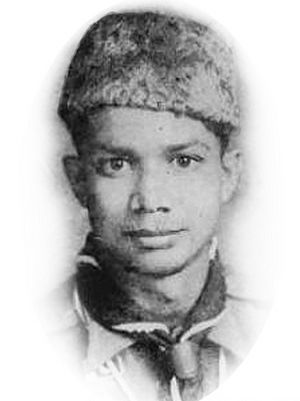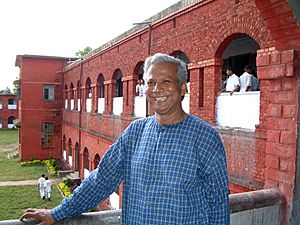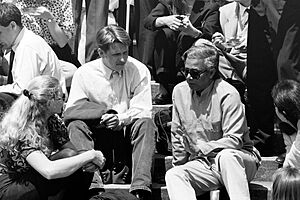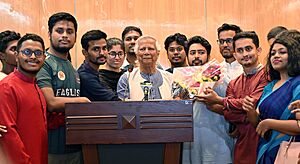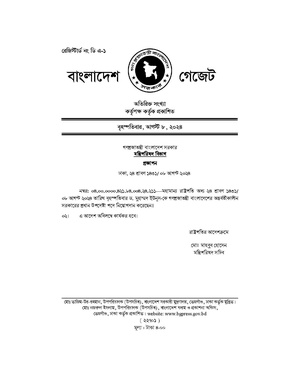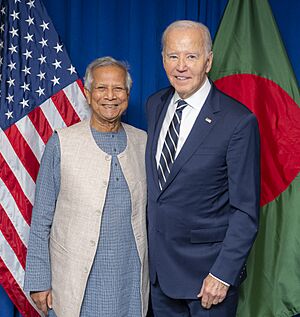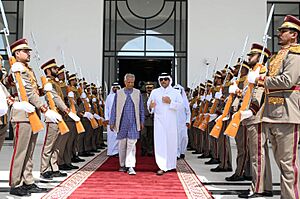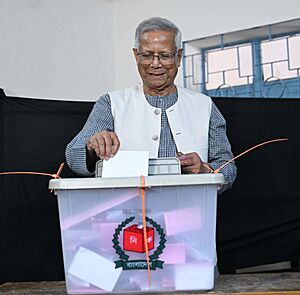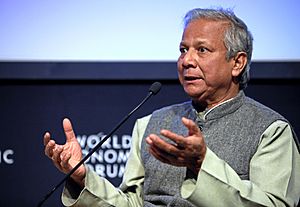Muhammad Yunus facts for kids
Quick facts for kids
Muhammad Yunus
|
|
|---|---|
|
মুহাম্মদ ইউনূস
|
|
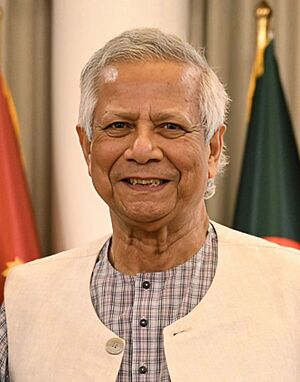
Yunus in 2025
|
|
| 5th Chief Adviser of Bangladesh | |
| In office 8 August 2024 – 17 February 2026 |
|
| President | Mohammed Shahabuddin |
| Preceded by | Sheikh Hasina (as Prime Minister) |
| Succeeded by | Tarique Rahman (as Prime Minister) |
| Adviser for Primary and Mass Education | |
| In office 3 April 1996 – 23 June 1996 |
|
| Chief Adviser | Muhammad Habibur Rahman |
| Preceded by | Khaleda Zia |
| Succeeded by | Abu Sharaf Hizbul Qader Sadique |
| Adviser for Environment, Forest and Climate Change | |
| In office 3 April 1996 – 23 June 1996 |
|
| Chief Adviser | Muhammad Habibur Rahman |
| Preceded by | Abdullah Al Noman |
| Succeeded by | Syeda Sajeda Chowdhury |
| Adviser for Science and Technology | |
| In office 3 April 1996 – 23 June 1996 |
|
| Chief Adviser | Muhammad Habibur Rahman |
| Preceded by | Rafiqul Islam Miah |
| Succeeded by | Abu Sharaf Hizbul Qader Sadique |
| Personal details | |
| Born | 28 June 1940 Hathazari, Bengal Province, British India |
| Citizenship |
|
| Political party | Independent (2007–present) |
| Other political affiliations |
Nagorik Shakti (2007) |
| Spouses |
|
| Children |
|
| Relatives | Muhammad Ibrahim (brother) |
| Education |
|
| Alma mater | University of Dhaka (BA, MA) Vanderbilt University (PhD) |
| Occupation |
|
| Awards |
|
| Signature |  |
|
Notable work
|
|
| Scientific career | |
| Institutions |
|
Muhammad Yunus (born on June 28, 1940) is a famous Bangladeshi economist and social entrepreneur. He served as the fifth chief adviser of Bangladesh from August 2024 to February 2026. Yunus is known for creating the idea of microcredit and microfinance. These are small loans given to poor people who don't have much money or property. For this important work, he received the Nobel Peace Prize in 2006. He is also the founder of Grameen Bank and was the first person from Bangladesh to win a Nobel Prize.
Yunus was born in Hathazari, Chittagong. He studied at Chattogram Collegiate School and Chittagong College. He earned his bachelor's and master's degrees from the University of Dhaka. Later, he received his PhD in economics from Vanderbilt University in the United States.
After a severe food shortage in Bangladesh in 1974, Yunus started working to help reduce poverty. He began trying out microfinance ideas in the late 1970s. In 1983, the Grameen Bank was officially started. The success of the Grameen microfinance model inspired similar projects in about 100 developing countries. It even influenced programs in developed countries like the United States. Yunus has received many other awards, including the United States Presidential Medal of Freedom in 2009 and the Congressional Gold Medal in 2010.
From 2012 to 2018, Yunus was the Chancellor of Glasgow Caledonian University in Scotland. Before that, he was an economics professor at Chittagong University in Bangladesh. He has written several books about his work in finance. He also helped start Grameen America and the Grameen Foundation, which support microcredit. Yunus was also a board member of the United Nations Foundation from 1998 to 2021.
During the July Revolution in Bangladesh in 2024, Yunus supported the students. After the Resignation of Sheikh Hasina, he was appointed as the chief adviser of an interim government in August 2024. His government appointed a Constitutional Reform Commission to draft changes to the Constitution of Bangladesh. It also organized the 2026 Bangladeshi general election and a 2026 Bangladeshi constitutional referendum on the July Charter.
In 2024, his name was included in The 500 Most Influential Muslims. In 2025, Time Magazine named him one of the 100 Most Influential People in the World.
Contents
Early Life and Education
Muhammad Yunus was born on June 28, 1940, in the village of Bathua, in the Chittagong District of what is now Bangladesh. He was the third of nine children. His father, Haji Muhammad Dula Mia Saudagar, was a jeweler, and his mother was Sufia Khatun. He spent his early childhood in the village. In 1944, his family moved to the city of Chittagong.
Yunus passed his high school exams from Chittagong Collegiate School. He ranked 16th out of 39,000 students in East Pakistan. During his school years, he was an active Boy Scout. He traveled to West Pakistan, India, and Canada for Jamborees. While studying at Chittagong College, he enjoyed cultural activities and won awards for drama. In 1957, he began studying economics at Dhaka University, earning his bachelor's degree in 1960 and his master's degree in 1961.
Career Highlights
Starting His Career
After graduating, Yunus worked as a research assistant at Dhaka University. In 1961, he became an economics lecturer at Chittagong College. He also started a successful packaging factory. In 1965, he received a scholarship to study in the United States. He earned his PhD in economics from Vanderbilt University in 1969. From 1969 to 1972, Yunus taught economics at Middle Tennessee State University.
During the Bangladesh Liberation War in 1971, Yunus helped create the Bangladesh Information Center in the United States. This center worked to gather support for Bangladesh's independence. After the war, he returned to Bangladesh and became the head of the Economics department at Chittagong University. After seeing the severe food shortage in 1974, he became very interested in reducing poverty. He started a rural economic program as a research project.
Grameen Bank and Microfinance
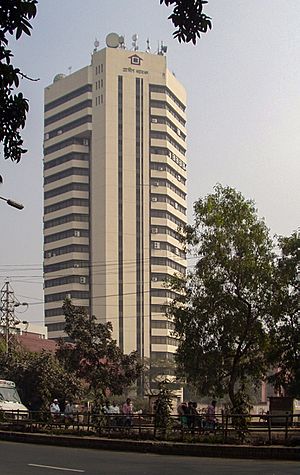
In 1976, Yunus visited poor families in a village near Chittagong University. He learned that even very small loans could make a huge difference for people. For example, women who made bamboo furniture had to borrow money at very high interest rates. This meant they lost most of their profits. Regular banks did not want to give small loans to the poor because they thought it was too risky. But Yunus believed that poor people would repay loans if given a fair chance.
Yunus lent $27 of his own money to 42 women in the village. They each made a small profit from this loan. This experience showed Yunus the power of microcredit. In December 1976, he secured a loan from a government bank to lend to the poor. This project grew, and by 1982, it had 28,000 members. On October 1, 1983, the project became a full bank for poor Bangladeshis, named Grameen Bank ("Village Bank").
To help ensure loans were repaid, Grameen Bank uses "solidarity groups." These are small groups of people who apply for loans together. Members support each other and act as co-guarantors for repayments. By July 2007, Grameen Bank had given out over $6.38 billion to 7.4 million borrowers.
In 1974 we ended up with a famine in the country. People were dying of hunger and not having enough to eat. And that's a terrible situation to see around you. And I was feeling terrible that here I teach elegant theories of economics, and those theories are of no use at the moment with the people who are going hungry. So I wanted to see if as a person, as a human being, I could be of some use to some people.
The Grameen model inspired similar efforts in many countries. Most Grameen loans went to women, who often suffer more from poverty. Women are also more likely to use their earnings to benefit their families.
The Yunus Centre, founded in 2008 in Dhaka, Bangladesh, is a think tank. It focuses on social business, reducing poverty, and sustainability. Chaired by Dr. Yunus, it promotes his ideas and supports related projects worldwide.
Global Impact
In July 2007, Yunus became a founding member of The Elders. This group of world leaders, brought together by Nelson Mandela, works to solve global problems. Yunus stepped down in 2009 due to his busy schedule.
Yunus is also a member of the Africa Progress Panel (APP). This group of ten individuals advocates for fair and sustainable development in Africa. Since 2010, Yunus has served as a Commissioner for the Broadband Commission for Digital Development. This UN initiative uses internet services to boost social and economic growth. In March 2016, he was appointed to a UN commission on health employment. After violence against Rohingya Muslims in 2016–2017, Yunus urged Myanmar to stop the attacks.
Public Service in Bangladesh
Adviser to the Caretaker Government
In 1996, Muhammad Yunus served as an adviser in a temporary government led by former Chief Justice Muhammad Habibur Rahman. In this role, he oversaw several important ministries. These included the Ministry of Primary and Mass Education, the Ministry of Science and Technology, and the Ministry of Environment and Forests.
Considering Political Leadership
In early 2006, Yunus joined other community leaders to promote honest candidates in national elections. He considered forming a political party called Nagorik Shakti (Citizens' Power) in 2007. His goal was to bring good leadership and governance to Bangladesh. However, after discussions with the head of the caretaker government, Yunus decided not to pursue his political plans.
Chief Adviser of Bangladesh (2024–2026)
During the July Revolution in Bangladesh in 2024, Yunus supported the students. After the Resignation of Sheikh Hasina, he was appointed as the chief adviser of an interim government in August 2024. This government was formed to manage state affairs during a time of change.
On August 8, 2024, President Mohammed Shahabuddin appointed Yunus as the Chief Adviser of Bangladesh. Yunus and his cabinet then took their oaths, forming the interim government. Soon after, he visited people injured during the unrest in Dhaka and Rangpur. After some unrest following the previous government's resignation, Yunus strongly spoke out against violence and worked to restore peace.

As Chief Adviser, Yunus worked to continue humanitarian aid for Rohingya refugees and supported the garment industry, which faced challenges before his appointment. On December 16, 2024, Yunus announced that general elections were planned for late 2025 or early 2026. On August 5, 2025, Yunus asked the Bangladesh Election Commission to hold the election before Ramadan 2026, which began on February 17.
In March 2025, Yunus announced that Bangladesh was finalizing a commercial agreement with SpaceX's Starlink. This aimed to bring reliable satellite internet across the nation. He emphasized that satellite internet would allow wider access to education, health services, and business opportunities, especially in rural areas. In April 2025, Yunus spoke at the United Nations Economic and Social Commission for Asia and the Pacific. He highlighted Bangladesh's dedication to a climate-friendly and digital economy.
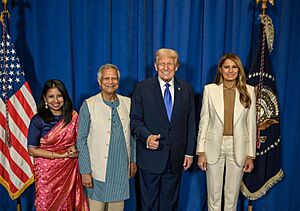
His administration faced some criticism for early challenges in maintaining order. However, it received praise for bringing back democratic rights like freedom of the press and speech. It also improved foreign relations and made important reforms, leading to high public approval. His term as Chief Adviser ended on February 17, 2026.
Key Reforms Under Yunus's Administration
- July Charter: The administration created the July Charter. This was a political agreement among 30 parties for changes to the constitution, government, and elections.
- New Parliament Structure: The July Charter discussions led to creating two separate houses of parliament. The Jatiya Sangsad has 400 members, and a new upper house (senate) has 100 elected members and 5 appointed by the President. The senate reviews laws but cannot introduce them.
- Unified Public Transport: All buses in Dhaka, the capital city, were brought under one system. This aimed to create an efficient public transport network.
- Traffic and Road Safety: The administration installed semi-automatic traffic signals in Dhaka. It also launched a real-time traffic monitoring center.
- Stronger Human Rights Commission: The National Human Rights Commission of Bangladesh (NHRC) received new powers. Before Yunus's government, the NHRC could not investigate law enforcement members. His administration changed this rule, giving the commission more power. It can now investigate, prosecute, and represent people. It can also inspect places to find secret detention centers.
- Police Accountability: To improve trust in the Bangladesh Police, especially after the July Revolution, Yunus's administration worked to make the police more accountable. A reform commission suggested clear interrogation rooms and using GPS trackers and bodycams. The government bought 40,000 bodycams for the police. This helped promote accountability during the 2026 Bangladeshi general election.
- Legal System Improvements: The government introduced mandatory pre-litigation mediation. This helps people resolve disputes before going to court. They also launched e-family courts for online proceedings and a digital legal aid program. This program offers free legal help to those who cannot afford it.
Personal Life
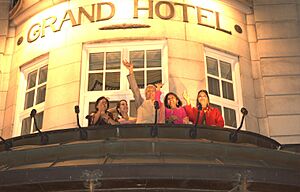
Muhammad Yunus is a Muslim. He has spoken about the importance of prayer and faith in his life. His father was a devout Muslim who completed the Hajj pilgrimage three times.
In 1967, while at Vanderbilt University, Yunus met Vera Forostenko. They married in 1970. Yunus's first marriage ended after his daughter, Monica Yunus, was born in 1977. Monica later became an opera singer in New York City. Yunus married Afrozi Yunus in 1980. She was a physics researcher and later became a physics professor. Their daughter, Deena Afroz Yunus, was born in 1986.
Yunus's brother, Muhammad Ibrahim, is a former physics professor. He founded The Center for Mass Education in Science (CMES). This center brings science education to young girls in villages.
Awards and Recognitions
Yunus and Grameen Bank jointly received the 2006 Nobel Peace Prize. The Norwegian Nobel Committee praised Yunus for turning his ideas into actions that helped millions. They noted that giving loans to poor people without financial security seemed impossible, but Yunus made it work.

Yunus was the first Bangladeshi to win a Nobel Prize. He announced that he would use part of his prize money to create a company that makes affordable, nutritious food for the poor. He also planned to establish a university and an eye hospital for the poor in Bangladesh.
Former U.S. President Bill Clinton strongly supported Yunus for the Nobel Prize. He called Yunus "a man who long ago should have won the Nobel Prize."
Yunus is one of only seven people to have won the Nobel Peace Prize, the Presidential Medal of Freedom, and the Congressional Gold Medal. Other notable awards include the Ramon Magsaysay Award in 1984 and the World Food Prize. He has also received 71 honorary doctorate degrees from universities in 27 countries. Bangladesh even issued a special stamp to honor his Nobel Award.
In March 2012, Fortune Magazine named Yunus one of the 12 greatest entrepreneurs of the modern era. The magazine stated that his ideas inspired many young people worldwide to work for social causes. In January 2008, Houston, Texas, declared January 14 as "Muhammad Yunus Day."
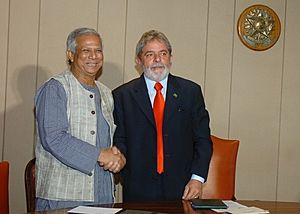
In 2010, the British magazine New Statesman listed Yunus among the "World's 50 Most Influential Figures." He has given many lectures globally and appeared on popular TV shows. He also played a key advisory role in the Paris 2024 Olympics. He promoted social business ideas and encouraged sustainable projects.
Works
Publications
- Yunus, Muhammad, Moingeon, Bertrand and Laurence Lehmann-Ortega (2010), "Building Social Business Models: Lessons from the Grameen Experience", April–June, vol 43, number 2–3, Long Range Planning, pp. 308–325
Documentaries
- 2000 – Sixteen Decisions
- 2010 – To Catch a Dollar
- 2011 – Bonsai People – The Vision of Muhammad Yunus directed by Holly Mosher
See also
 In Spanish: Muhammad Yunus para niños
In Spanish: Muhammad Yunus para niños
- Yunus Centre
- Yunus Social Business
- List of chief advisers of Bangladesh
- List of Nobel Peace Prize laureates
 | Laphonza Butler |
 | Daisy Bates |
 | Elizabeth Piper Ensley |


